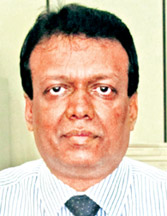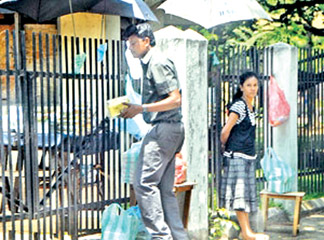|
Stringent measures on food safety standards:
CMC comes down hard on eateries
By Ranil WIJAYAPALA
|

Dr. Pradeep Kariyawasam
|
As Colombo is getting cleaner with the city beautification program of
the Colombo Municipal Council (CMC) which is progressing at a pace
regulations on food hygiene are becoming stricter to ensure that people
in the city consume hygienic food.
The Public Health Department (PHD) of the CMC which is the prime
authority to monitor food hygiene in the city has taken number of
measures to ensure that food in the city is safe for consumption.
Dr. Pradeep Kariyawasam, Chief Medical Officer of the CMC says that
they have to be strict on food hygiene to ensure that no food poisoning
cases are reported from Colombo.
As a part of the program the PHD will introduce new regulations on
the sale of lunch packets in the city as they have found so many
irregularities and spoilt meals being sold by vendors.
"True that the sale of lunch packets on pavements have been stopped.
Yet people from outstation and from the city sell lunch packets which
are not suitable for consumption, Dr. Kariywasam told the Sunday
Observer.
He said there were public complaints about the quality of the food
parcels or the lunch packets available on pavements and we have
commenced testing samples.
One thing that they have noticed was that these packets are quite
cheap. So I don't think the people who prepare these lunch packets take
precautionary measures to maintain quality and hygienic standard. At the
same time most of the people who are selling these lunch packets are
coming from outstation and they prepare them early in the morning, pack
them and transport them to the city and continue to sell them till about
two or three o'clock in the afternoon.
From the time of preparation it takes eight to nine hours till the
time they sell the lunch packets.
 "Rice cannot be kept for more than four or five hours. After five
hours they get spoilt because they are packeted. Every minute mini
microbes grow, as rice is a good medium for bacterial growth," Dr.
Kariyawasam added. "Rice cannot be kept for more than four or five hours. After five
hours they get spoilt because they are packeted. Every minute mini
microbes grow, as rice is a good medium for bacterial growth," Dr.
Kariyawasam added.
The CMC food inspectors have taken samples of lunch packets for
testing and to obtain a bacterial count at laboratories to see whether
they are suitable for consumption.
"About ten years ago we started testing samples and at that time
about one third of the lunch packets were spoilt. About three years ago
it was about 15 to 16 percent were spoilt when we checked them before 12
noon. This time when we take samples more than 35 per cent of the lunch
packets are spoilt before 12 o'clock. More than 60 percent of the lunch
packets which were checked at 2 o'clock were not suitable for
consumption," Dr. Kariyawasam said.
Apart from the people who bring lunch packets to the city from
outstations there are people who prepare lunch packets in the city and
supply to kiosks and small outlets.
"Among them also about 10 percent of the lunch packets were in bad
conditions. But lunch packets which were brought from outstations the
situation was worse. So we thought to introduce regulations with regard
to the sell of lunch packets," he added.
According to the regulations those selling lunch packets should get a
certificate from the area MOH from where they are preparing the meal
stating that the food is prepared under hygienic conditions and the
kitchen and utensils are suitable for the preparation of meals and they
are packed properly.
"The MOH should certify that the water used for the preparation of
meals is from the main line and sanitary facilities are adequate and the
utensils are clean," Dr. Kariyawasam said
"We have identified over 65 people who are bringing lunch packets for
sale in Colombo city. Another 20 people registered with us. We will
instruct area MOH to inspect the premises where the meals are prepared.
Once the certificate is issued the CMC will train these people how to
prepare meals, pack them and transport them. The first training program
will be conducted on August 26.
The CMC will train them how to prepare, pack and transport the lunch
packets and see that they are not selling lunch packets after four hours
of preparation. The area MOH will have to endorse that they have checked
the places where they sell the lunch packets.
A certificate should be produced when necessary, he added.
The lunch packets should bear the seal indicating the time, date and
place of preparation.
Failure to comply with the regulations will be dealt with, he said.
"We are doing these things for the safety of consumers.' Those who
sell food are registered under the Food Act.
Vans and three-wheelers should also comply with the regulations.
Whilst enforsing strict regulations on food vendors the CMC has also
taken strict measures to maintain food hygienic standards among the city
hotels. Many hotels failed to comply with the stipulated standards of
the CMC.
"This year we started calling hotel workers for medical tests. All
the workers have to undergo medical examination and laboratory test
which includes chest x-ray for TB. All hotel workers need to wear
uniforms, and ensure a clean kitchen.
"Around 550 food outlets have obtained licences last year. So far
only 200 outlets had obtained licences. Food safety standards are
improving", Dr. Kariyawasam said.
Food sample from hotels are contaminated.
Until steps have been taken to ensure the safety of food we don't
issue licence, Dr. Kariyawasam explained.
"Some star-class hotels have complied with the CMC standards, he
added.
Dr. Kariyawasam said workers in star-class hotels are reported to
have contracted typhoid and hepatitis.
"People have complained that they had contracted hepatitis and
typhoid. People who had come on holiday ended up being sick," he added.
But some hotels are doing their best to keep the place clean", he
said.
Hotel employees who have undergone medical examination still find it
difficult to obtain Tourist Board approval.
"The medical examination, are done in a superficial manner", he said.
Among hotel workers a high rate of hepatitis and typhoid have been
reported. The Medical officers attached to some of these hotels does not
report these cases although by law they are bound to inform the Public
Health Inspectors.
Dr. Kariyawasam said when the Health Ministry introduces Food Hygiene
Regulations they will be stricter than CMC regulations as under the new
regulations eight laboratory tests will be conducted although the CMC
conducts only five laboratory tests. What we want the hotels to do is to
treat workers affected by communicable diseases", he said.
Dr. Kariyawasam said that the CMC is satisfied with the way small
hotels are progressing. But we have to test food samples and follow it
up as they will not maintain standards," he said.
Food hygiene conditions in the city have improved", he said. |

